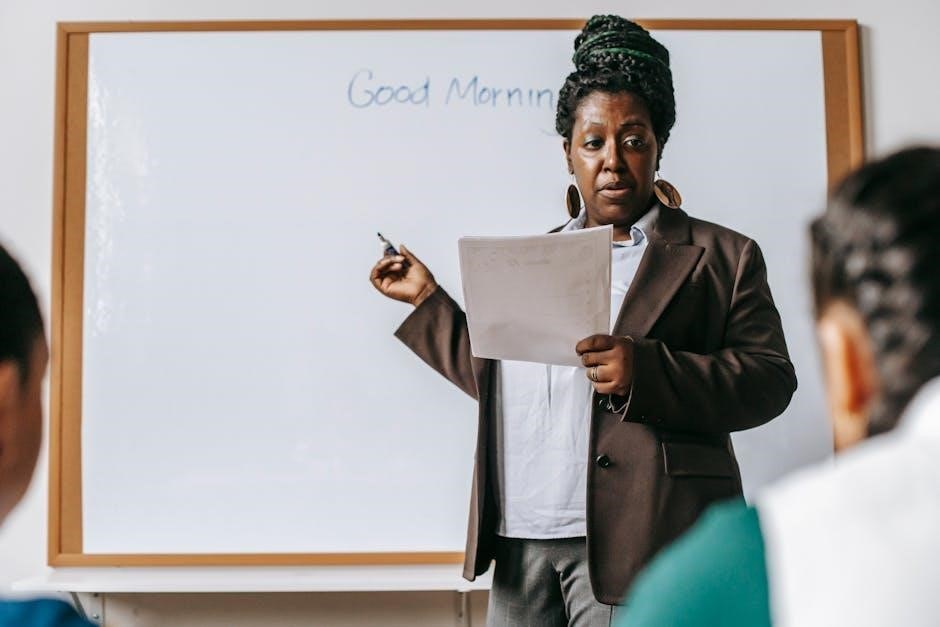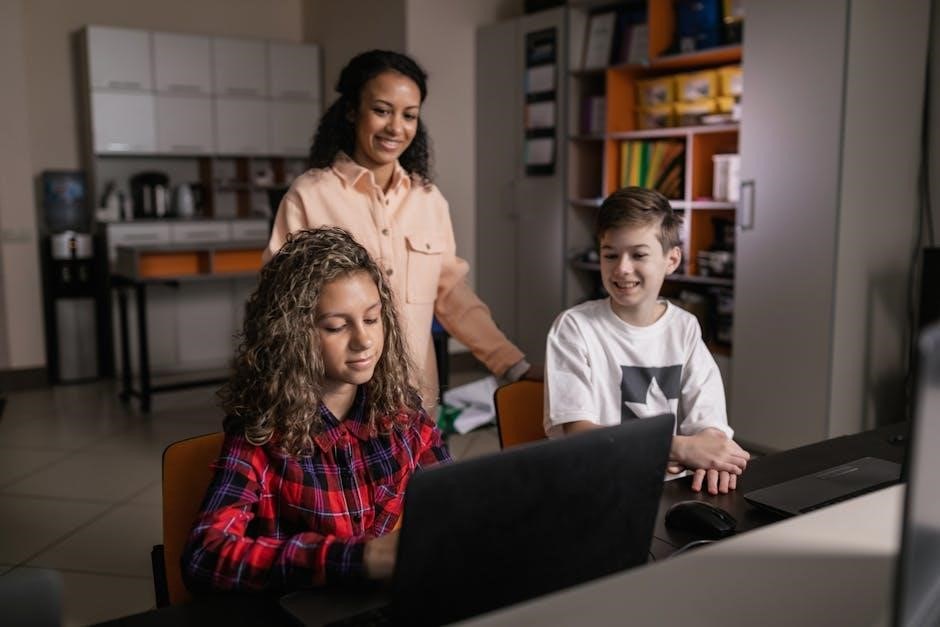An instructional facilitator plays a pivotal role in shaping the educational landscape by empowering educators with innovative strategies, resources, and support to enhance teaching and learning experiences.
Defining the Instructional Facilitator
An instructional facilitator is an educator who plays a crucial role in supporting teachers and students by providing resources, training, and guidance to enhance teaching and learning. They act as a bridge between educational strategies and classroom implementation, ensuring that teachers are equipped with the latest methodologies and tools. Instructional facilitators often work at the school or district level, focusing on professional development, curriculum design, and data-driven instruction. Their primary goal is to foster a collaborative environment where educators can grow professionally, leading to improved student outcomes. By combining leadership, communication, and subject matter expertise, instructional facilitators help schools achieve their educational objectives effectively.
The Importance of Instructional Facilitators in Education
Instructional facilitators are essential in empowering educators to enhance teaching quality and student performance. By providing professional development, they help teachers adapt to new strategies and technologies, ensuring classrooms remain dynamic and effective. Their support enables educators to focus on student-centered approaches, fostering engagement and understanding. Instructional facilitators also bridge the gap between educational research and practical application, ensuring schools stay aligned with best practices. Their role in curriculum development and data-driven decision-making further strengthens the educational framework. Ultimately, they play a pivotal role in creating a collaborative and innovative learning environment, directly contributing to school improvement and student success. Their impact is vital in shaping the future of education and preparing students for lifelong learning.

Key Responsibilities of an Instructional Facilitator
Instructional facilitators empower educators by providing resources, strategies, and professional development, ensuring effective teaching methods and curriculum alignment to enhance student learning and achievement.
Supporting Teachers in Instructional Strategies
Instructional facilitators play a crucial role in helping teachers implement effective instructional strategies. They provide professional development opportunities, share best practices, and guide educators in using evidence-based methods to enhance student engagement and understanding. By introducing innovative techniques such as scaffolding, cooperative learning, and the 5E model, facilitators empower teachers to create dynamic learning environments. They also assist in aligning instructional strategies with curriculum goals, ensuring a cohesive approach to teaching and learning. Through active participation and constructive feedback, facilitators enable teachers to refine their skills, fostering a culture of continuous improvement and student-centered education.
Facilitating Professional Development
Instructional facilitators are instrumental in fostering professional growth among educators by organizing and leading development opportunities. They collaborate with teachers to identify learning needs and design tailored programs, ensuring educators stay updated on best practices and research-based methods. These programs often include workshops, coaching sessions, and peer-to-peer learning experiences, aimed at enhancing teaching skills and classroom effectiveness. Facilitators also encourage the adoption of innovative instructional techniques, such as scaffolding and cooperative learning, to improve student outcomes. By fostering a culture of continuous improvement, they help educators develop leadership and communication skills, enabling them to adapt to evolving educational demands effectively. This support system ensures teachers are well-equipped to meet the diverse needs of their students, promoting a more dynamic and inclusive learning environment.
Assisting in Curriculum Development
Instructional facilitators play a crucial role in curriculum development by collaborating with educators to design and implement effective learning programs. They work closely with teachers to align curricula with educational standards and ensure content is relevant and engaging for students. Facilitators also assist in integrating diverse resources, such as digital tools and multimedia, to enrich the learning experience. By staying updated on educational research, they help incorporate evidence-based practices into the curriculum. Additionally, facilitators support the development of assessments to measure student progress and ensure the curriculum meets the needs of all learners. Their involvement in curriculum development fosters a cohesive and adaptive educational framework, ultimately enhancing student outcomes and preparing them for future challenges.

Instructional Strategies for Effective Teaching
Instructional strategies for effective teaching include the 5E Model, scaffolding techniques, and cooperative learning. These methods enhance student engagement, understanding, and collaboration, fostering a dynamic learning environment.
The 5E Instructional Model
The 5E Instructional Model is a widely used, student-centered approach to teaching and learning. It consists of five phases: Engage, Explore, Explain, Elaborate, and Evaluate. The Engage phase captures students’ attention and connects new concepts to prior knowledge. During Explore, students participate in hands-on activities to discover ideas. Explain involves clarifying concepts through discussion and demonstration. Elaborate extends understanding by applying concepts to new contexts, while Evaluate assesses learning through formative and summative methods. This model fosters curiosity, critical thinking, and long-term retention. Instructional facilitators often support teachers in implementing this model, ensuring it aligns with curriculum goals and enhances student engagement, making it a powerful tool for effective teaching and learning environments.
Scaffolding Techniques

Scaffolding techniques are instructional strategies that provide temporary support to students as they learn new concepts or skills. These techniques help bridge the gap between what students already know and what they need to learn. Instructional facilitators often guide teachers in implementing scaffolding methods, such as breaking tasks into smaller steps, using visual aids, or providing guided practice. For example, think-pair-share activities or graphic organizers can scaffold students’ thinking. Scaffolding is particularly effective in differentiated instruction, allowing teachers to meet diverse learner needs. By gradually releasing responsibility to students, scaffolding promotes independence and deep understanding. Instructional facilitators play a key role in helping educators identify when and how to apply these techniques effectively, ensuring students are supported throughout the learning process while fostering confidence and competence. This approach is essential for creating an inclusive and equitable learning environment.
Cooperative Learning Strategies
Cooperative learning strategies involve structured group activities that promote collaboration and active participation among students. Instructional facilitators encourage teachers to implement these strategies, fostering an environment where students work together to achieve common goals. Techniques like think-pair-share, group discussions, and problem-solving tasks are commonly used. These methods not only enhance academic engagement but also develop critical thinking and communication skills. By promoting peer interaction, cooperative learning strategies help students build mutual respect and accountability. Instructional facilitators play a crucial role in guiding educators to design and implement these strategies effectively, ensuring that all students, regardless of their background, can contribute and learn from one another. This approach aligns with modern educational goals of creating inclusive and collaborative learning spaces.

Professional Development for Instructional Facilitators
Professional development for instructional facilitators involves ongoing learning to refine leadership, communication, and instructional skills, ensuring they stay current with educational research and best practices.
Building Leadership Skills
Building leadership skills is essential for instructional facilitators to effectively guide educators and foster collaborative learning environments. By developing strong leadership, facilitators can inspire and motivate teachers to adopt innovative instructional strategies. Leadership training often includes workshops, mentorship programs, and experiential learning opportunities that focus on communication, decision-making, and conflict resolution. These skills enable facilitators to lead professional development initiatives, facilitate team discussions, and advocate for evidence-based practices. Effective leadership also empowers facilitators to support school-wide initiatives, promote a culture of continuous improvement, and drive student success. Ultimately, strong leadership skills are critical for instructional facilitators to thrive as change agents in education.
Improving Communication Skills
Improving communication skills is vital for instructional facilitators to effectively collaborate with teachers, students, and stakeholders. Strong communication fosters clarity, understanding, and trust, enabling facilitators to convey complex ideas and strategies clearly. Active listening, verbal clarity, and non-verbal cues are essential components of effective communication. Facilitators should also learn to navigate conflicts and diverse perspectives through empathetic and culturally responsive dialogue. Professional development programs often emphasize communication training, including workshops on public speaking, conflict resolution, and interpersonal interactions. By refining these skills, instructional facilitators can build stronger relationships, facilitate meaningful discussions, and create inclusive learning environments that support both teacher growth and student success.
Staying Updated on Educational Research
Staying updated on educational research is crucial for instructional facilitators to provide evidence-based support to teachers and students. Continuous learning ensures facilitators remain informed about innovative teaching methods and best practices. By engaging with academic journals, attending conferences, and participating in professional networks, facilitators can access cutting-edge research on instructional strategies, assessment techniques, and curriculum design. This knowledge enables them to guide teachers in implementing effective practices, such as scaffolding or cooperative learning, to enhance student outcomes. Additionally, staying informed about educational trends helps facilitators address emerging challenges and opportunities, ensuring they remain relevant and impactful in their roles. Regular professional development is essential to maintain expertise and foster a culture of lifelong learning.

Technology Integration in Instructional Facilitation
Technology integration in instructional facilitation enhances learning experiences by leveraging digital tools like Google Lens, search functionalities, and EdTech solutions, fostering engagement and simplifying tasks for educators.
Using Digital Tools for Classroom Engagement
Digital tools play a crucial role in enhancing classroom engagement by making lessons interactive and accessible. Instructional facilitators can leverage platforms like Google Classroom, interactive simulations, and educational apps to create dynamic learning environments. Tools such as Kahoot! or Mentimeter encourage participation through real-time quizzes and polls, fostering student involvement. Additionally, Google Lens and advanced search functionalities allow facilitators to quickly find and integrate visual resources, making complex concepts more relatable. By incorporating these tools, educators can cater to diverse learning styles, promote collaboration, and ensure students remain attentive and motivated. This approach not only enhances engagement but also prepares learners for the digital demands of the future.
Implementing EdTech Solutions
Instructional facilitators play a key role in integrating EdTech solutions to enhance teaching and learning. By leveraging tools like Google Classroom, interactive simulations, and educational apps, facilitators help educators create engaging and personalized learning experiences. Implementing these technologies involves training teachers, troubleshooting technical issues, and ensuring seamless integration into lesson plans. Additionally, facilitators stay updated on the latest EdTech trends, such as AI-powered learning platforms and adaptive software, to address diverse student needs. Effective implementation requires collaboration with educators, ensuring that technology enhances rather than distracts from instruction. This approach fosters a dynamic classroom environment, promotes student engagement, and supports data-driven decision-making for improved outcomes.
Online Resources for Facilitators
Online resources are essential tools for instructional facilitators, enabling them to access a wealth of information and strategies to support educators. Platforms like Google Classroom and educational apps provide interactive learning experiences, while tools such as Google Lens and advanced search functions help facilitators quickly find relevant content. Additionally, websites like Khan Academy and Coursera offer professional development opportunities, allowing facilitators to enhance their skills and stay updated on best practices. Online forums and communities also serve as collaborative spaces for sharing strategies and addressing challenges. These resources empower facilitators to create engaging, technology-rich learning environments that cater to diverse student needs and promote academic success. Leveraging these tools is crucial for effective instructional support in modern education.

Assessment and Data-Driven Instruction
Instructional facilitators utilize assessments and data to analyze student performance, align instruction with learning objectives, and make informed decisions to enhance teaching effectiveness and student outcomes.
Using Student Achievement Data
Instructional facilitators analyze student achievement data to identify learning gaps, track progress, and inform instructional strategies; By interpreting this data, they help educators adjust teaching methods to meet student needs, ensuring personalized and effective learning experiences. Data-driven insights enable facilitators to collaborate with teachers in developing targeted interventions and assessing program effectiveness. This approach ensures that instructional decisions are grounded in evidence, leading to improved academic outcomes and equitable education. Facilitators also train teachers to use data effectively, fostering a culture of continuous improvement and accountability in schools.
Formative Assessment Strategies
Instructional facilitators emphasize the use of formative assessment strategies to monitor student progress and adjust teaching methods. These strategies, such as exit tickets, quizzes, and class discussions, provide real-time insights into student understanding. Facilitators train teachers to design and implement these assessments effectively, ensuring timely feedback and differentiated instruction. By fostering a culture of ongoing evaluation, facilitators help educators identify learning gaps and tailor lessons to meet individual needs. This approach not only enhances student engagement but also promotes a data-driven classroom environment. Ultimately, formative assessments enable instructional facilitators to support teachers in delivering targeted, impactful instruction that drives student success and growth.
Creating Effective Feedback Loops
Instructional facilitators play a crucial role in establishing effective feedback loops that enhance both teaching and learning. By training educators to implement formative assessments and reflective practices, facilitators ensure that feedback is timely, specific, and actionable. Tools such as exit tickets, peer reviews, and digital platforms are often utilized to gather student insights, enabling teachers to adjust their instruction dynamically. Facilitators also guide teachers in communicating clear expectations and encouraging student self-assessment. This iterative process fosters a collaborative learning environment where students and educators alike can grow. Effective feedback loops not only improve student performance but also empower teachers to refine their instructional strategies, creating a cycle of continuous improvement in the classroom.

Future Trends in Instructional Facilitation
Future trends in instructional facilitation emphasize integrating AI, personalized learning, and equity-focused strategies. These innovations aim to create adaptive, inclusive, and impactful educational environments.
Personalized Learning Approaches
Personalized learning approaches tailor instruction to meet individual student needs, fostering engagement and deeper understanding. Instructional facilitators play a key role in implementing these strategies by leveraging data to identify learning gaps and adapting instruction accordingly. By integrating technology and flexible learning paths, facilitators ensure that students receive targeted support. This approach not only enhances academic outcomes but also promotes equity, as it addresses diverse learning styles and abilities. Facilitators collaborate with teachers to design customized lesson plans and assess progress continuously. Personalized learning empowers students to take ownership of their education, creating a more inclusive and effective learning environment that prepares them for future challenges.
Integration of AI in Education
The integration of AI in education is transforming the way instructional facilitators support teaching and learning. AI tools enable personalized learning experiences by analyzing student data to identify strengths and gaps, allowing for tailored interventions. Facilitators can leverage AI to automate administrative tasks, such as grading and progress tracking, freeing up time for more strategic support. Moreover, AI-powered resources, like adaptive learning platforms and virtual simulations, enhance engagement and provide real-time feedback. These technologies also facilitate data-driven decision-making, helping facilitators and teachers align instruction with student needs. As AI continues to evolve, it promises to create more dynamic and inclusive learning environments, ensuring equitable access to high-quality education for all students. This shift underscores the role of facilitators in bridging technology and pedagogy for future-ready classrooms.
Focus on Equity and Inclusion
Instructional facilitators play a critical role in fostering equity and inclusion in education by ensuring all students have access to diverse learning opportunities. They work to identify and address systemic barriers that may hinder student success, promoting culturally responsive teaching practices. By advocating for inclusive curricula and differentiated instruction, facilitators help educators meet the needs of diverse learners. Professional development initiatives often focus on equity training, enabling teachers to create safe and inclusive classroom environments. Additionally, facilitators support the integration of technology to bridge gaps for underserved populations, ensuring equitable access to resources. Their efforts aim to create a learning environment where every student feels valued and empowered to succeed, regardless of their background or abilities. Equity and inclusion are foundational to their mission of fostering student achievement and social growth.



